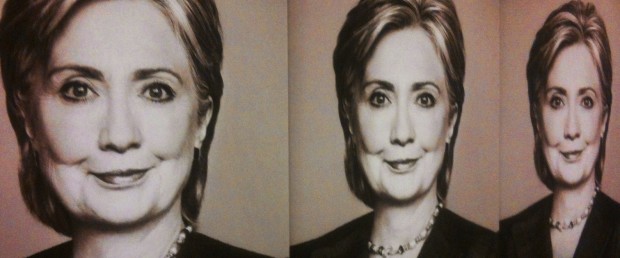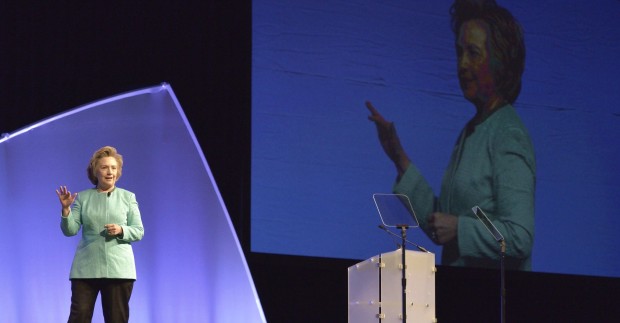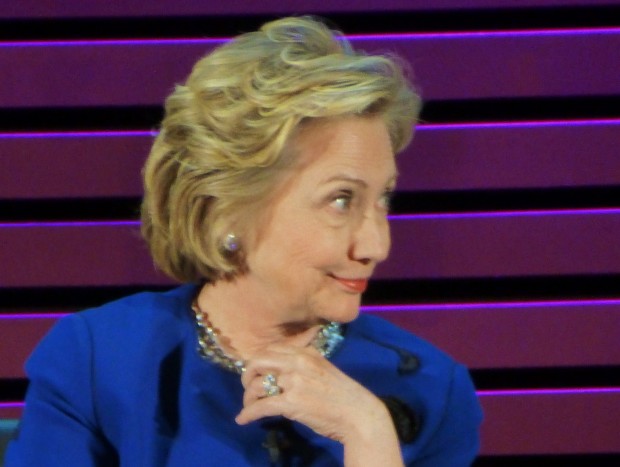Gangster Capitalism: Hillary Clinton’s Push to Globalize Surveillance and Data Mining
When a Clinton speaks, be it aspiring presidential candidate wife or former president husband, we know we are in for a bag packed with tricks. These serve to remind us that the unscrupulous “we the President” team are still a political force waiting to snatch power with insatiable lust. Dismiss and forget them at your peril. They are the true American couple of political grit and ruthlessness.
Former United States Secretary of State Hillary Clinton has suggested a “global compact” to regulate surveillance and the use of collected data. “At some point, I think there needs to be a global pact about surveillance and information and what it’s used for.”
The main argument she is making here is that the US is being unduly singled out for its intrusive conduct after the revelations of Edward Snowden. United States technology companies, for this reason, were getting undue attention and punishment at the hands of competitors. Astonishing that US products were not being sought, given the links between US surveillance practices and technological products.
A few startling gems found their way into her speech before the Nexenta OpenSDx Summit in San Francisco on Thursday, August 28, 2014. One stands out. “The US government doesn’t use information for commercial purposes.” This is a fundamental point, and it suggests the deepest of traumas that afflict the American political personality: do not interfere with the capacity of our companies to accumulate wealth. They are not to blame for what they have always done.
As for the suggestion that the US government is above industrial espionage, or using information obtained illicitly to further any supposed commercial edge, the expression “Pull the other one, it’s got bells on it,” comes to mind. The tactic here is to highlight egregious behavior on the part of its competitors to trumpet the line that Washington does nothing of the sort. In this regard, the moves of US Attorney General Eric Holder to charge members of the Chinese military with economic espionage were typical. China, argued Holder, had pilfered trade secrets from American companies and committed acts of illegal “sabotage” that enabled its own companies to succeed “in the international marketplace.”
There is much to suggest that the entire basis of US foreign policy and, to a large extent government, is a corporate charter, an enlarged boardroom of directors, shares and assets. But the illusion of a separation is always maintained. Companies aren’t exactly fine representatives of democratic representation – their existence, for one thing, owes nothing to traditional rights and liberties. In many ways, the company ideal is a tumor on American democracy: it suggests that the moneyed classes are somehow representative of the finest traditions of classical liberalism. They are not.
In this, Clinton is being chronically traditional. “We need to make it clear to other countries that our technology companies are not part of our government, and that we have more legal processes that I’m aware of” dealing with government requests for information. (She obviously has not familiarized herself with the heavy European Union law book on the subject.)
United States General Smedley Butler, on the other hand, was a far more honest exponent of his country’s version of power by wallet and rifle. During the period of his service in the Marines, he became, by his own admission, “a high class muscle-man for Big Business, for Wall Street and for the Bankers. In short, I was a racketeer, a gangster for capitalism.”
Butler’s spine tingling honesty cuts through the paeans for democratic and corporate good behavior supposedly reflected in the US ideal. “I helped make Mexico, especially Tampico, safe for American oil interests in 1914. I helped make Haiti and Cuba a decent place for the National City Bank boys to collect revenues in. I helped the raping of half a dozen Central American republics for the benefits of Wall Street. The record of racketeering is long.”
Nor has the US been above industrial espionage. As historian Doron Ben-Atar observes in Trade Secrets: Intellectual Piracy and the Origins of American Industrial Power (2004), “The United States emerged as the world’s industrial leader by illicitly appropriating mechanical and scientific innovations from Europe.” During the early years of the Republic, Europe was filled with American industrial spies. Britain was particularly crowded with them. Workers and machines were sought. Plans and ideas were noted. Individuals such as Francis Cabot Lowell were America’s first industrial appropriators. If the British have an idea, such as the Cartwright power loom, pinch it.
What is important in the Clinton suggestion is that US openness is being juxtaposed against the opaque information regimes of Russia and China. The latter hunger for US technology and covet state-of-the-art ideas that they could never come up with. There is also a sense of chest-thumping pride – Team America is technologically savvy, and can’t be too sharing in that regard. “Every time I went to countries like China or Russia, I mean, we couldn’t take our computers, we couldn’t take our personal devices, we couldn’t take anything off the plane, because they’re so good, they would penetrate them in a minute.”
Such behavior speaks to frequent instances of technological skirmishes: Who will break the next code, access the next device, prize open the door to wealth? Fine it might be for the National Security Agency to be doing it; not quite so appropriate when it comes to the efforts of China, Russia or Brazil. We, suggests Clinton, are above this.
What Clinton is arguing for, a strategy that has characterized the Washington formula towards competition for decades, are ways of leveling, if not burying the field. True competition is a fiction maintained through the illusion of legal regulations. The US, to a large extent, has maintained this fiction through the regulatory framework of international rules that target intellectual piracy. This is evident in such packages as the Trans-Pacific Partnership (TPP) Agreement: an arrangement that would railroad competition altogether by pushing through a digital agenda drafted in Washington. It is axiomatic to these efforts that the BRICS countries are excluded. They, after all, are the problem.
The Intellectual Property chapter of the TPP is particularly illuminating; it revises provisions that the US Congress has rejected as being unduly intrusive and restraining, and it runs them through an international forum that will have 14 or so signatories. Such tactics suggest that the genius of American technology is being blunted over time. The pirates are shielding themselves behind laws. They are short of ideas. Now, this is one for the books.
Editor’s Notes: Photograph one by Lucas Cobb; three and six by Mike Mozart; four and ten from US Army; five from UM Women archive, seven by Tau Zero, eight by Aphrodite in NYC, nine by Digital Cat, eleven from Light Brigade.
Related Articles
























You must be logged in to post a comment Login